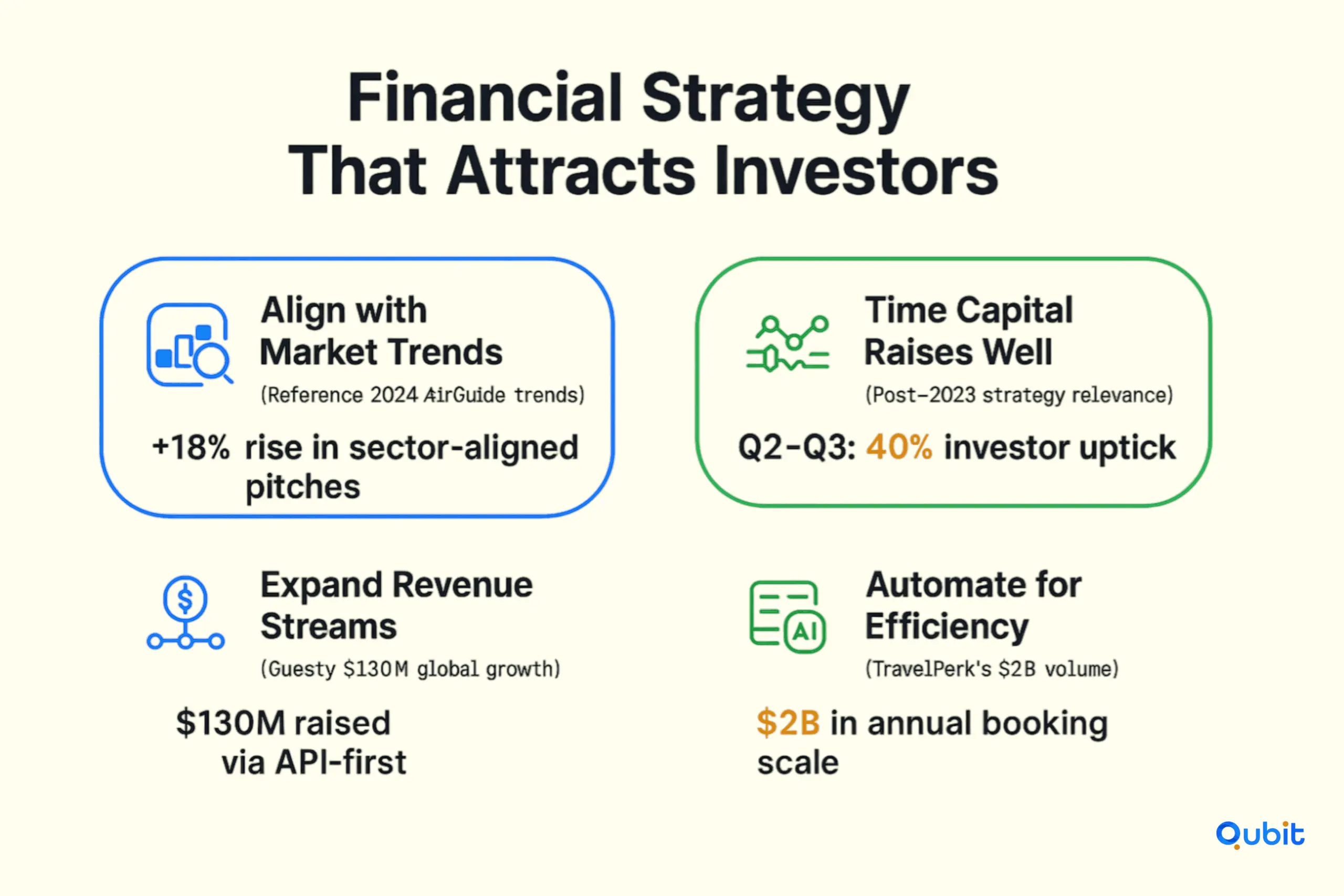The travel industry is brimming with opportunities, but securing funding to scale a travel start-up remains a significant challenge for many entrepreneurs. With global travel funding dropping to $5.2 billion in 2023, understanding innovative funding strategies has never been more critical. This blog explores actionable insights on how to attract investors, build strategic partnerships, and integrate technology to position your travel start-up for success.
A comprehensive review of travel startup fundraising strategies provides you with a baseline to contextualize detailed funding options as you scale your travel start-up. This link offers foundational knowledge for novice entrepreneurs, ensuring they understand both equity and non-equity funding routes before diving deeper.
Let’s jump right in!
Market Analysis: Assessing Global Growth & Competitive Positioning
The travel technology market is undergoing a significant transformation, driven by advancements in artificial intelligence and evolving consumer demands. With a projected compound annual growth rate (CAGR) of 9.59% through 2025, this sector is poised for substantial expansion, offering businesses opportunities to align their strategies with emerging trends. According to Global Growth Insights, AI adoption is a key factor fueling this growth, highlighting the importance of integrating innovative solutions to remain competitive.
Understanding Market Expansion
The travel tech industry’s projected growth underscores its potential to reshape global travel experiences. Businesses can utilize this data to craft compelling pitches that resonate with investors, emphasizing the sector’s scalability and long-term profitability. For instance, the market value projection for travel technologies demonstrates how AI-driven tools are enhancing operational efficiency and customer engagement. This insight can serve as a foundation for strategic planning and investment discussions.
Competitive Positioning Through Strategic Partnerships
In a crowded marketplace, differentiation is critical for startups aiming to secure a foothold. A closer examination of travel startup venture capital highlights how corporate funding can influence growth dynamics, offering you insight into alternative investment structures. Strategic collaborations with corporate investors not only provide financial backing but also open doors to industry expertise and networks, enabling startups to refine their offerings and strengthen their competitive positioning.
Harnessing Emerging Trends
To thrive in this rapidly evolving landscape, businesses must align their services with shifting traveler preferences. From personalized itineraries to AI-powered booking platforms, the integration of cutting-edge technologies can enhance customer satisfaction and drive loyalty. Staying attuned to these trends ensures that companies remain relevant and adaptable, positioning themselves as leaders in innovation.
By focusing on market analysis and competitive positioning, businesses can unlock new opportunities in the travel tech sector. Whether through strategic partnerships or embracing emerging technologies, the path to growth lies in understanding the dynamics shaping this industry.
Standing out in a crowded marketplace requires more than just a great product or service, it demands a compelling brand identity. For travel startups, this challenge is magnified by the sheer volume of competitors vying for attention. A well-crafted brand story can serve as the cornerstone of differentiation, helping businesses connect emotionally with their audience and build lasting loyalty.
Brand Identity
Brand identity is not just about aesthetics; it encompasses the values, mission, and personality that resonate with your target audience. For travel startups, balancing reliability with excitement is key to capturing the modern traveler’s attention. Consistency across digital platforms further reinforces trust, ensuring that every interaction strengthens the brand’s image.
Moreover, a strong brand can influence critical business decisions, including funding opportunities. For instance, this discussion of venture debt travel startup options reveals how brand image impacts risk assessment and funding terms in venture debt contexts. Investors often evaluate how well a startup’s brand aligns with its growth strategy, making it essential to craft a narrative that inspires confidence.
Ultimately, a distinct brand identity is not just a competitive advantage—it’s a necessity. By focusing on authenticity and consistency, travel startups can rise above the noise and establish themselves as trusted names in the industry.
Strategic Partnerships: Collaborating for Mutual Growth
Strategic partnerships offer businesses the opportunity to achieve shared success by combining resources, expertise, and networks. These alliances are particularly valuable for startups and growing companies, as they can accelerate growth without requiring significant capital investment.
The Role of Collaboration in Scaling Metrics
Collaborating with complementary businesses can enhance operational efficiency and improve key performance metrics. For example, travel startups aiming to scale their operations before pursuing Series B funding can benefit from partnerships that expand their customer base or streamline service delivery. A detailed study of series b metrics travel startup performance equips you with benchmarks that inform your approach to scaling operations. Strategic partnerships can elevate these metrics, making your business more attractive to investors.
Cross-Promotion and Revenue Diversification
Cross-promotion strategies are another powerful benefit of partnerships. By working with businesses that share a similar target audience, companies can lower customer acquisition costs while diversifying revenue streams. For instance, a travel startup might partner with a hospitality brand to offer bundled services, creating a win-win scenario for both parties.
Keys to Successful Partnerships
Success in strategic alliances hinges on three critical factors:
- Clear Communication: Establishing open lines of communication ensures that both parties understand expectations and responsibilities.
- Aligned Goals: Partnerships thrive when both businesses share mutual objectives, whether it’s expanding market reach or improving customer satisfaction.
- Performance Tracking: Regularly evaluating the partnership’s impact on business metrics helps identify areas for improvement and ensures sustained growth.
Strategic partnerships are not just about pooling resources—they’re about creating synergies that drive mutual growth. By focusing on collaboration, businesses can unlock new opportunities and achieve milestones that might otherwise be out of reach.
Customer Experience: Elevating Service for Repeat Business
Delivering exceptional customer experiences is the cornerstone of fostering loyalty and driving repeat business. When customers feel valued and understood, they are far more likely to return and recommend your services to others. This creates a ripple effect, where positive word-of-mouth amplifies your brand’s reputation and attracts new customers organically.
Actively seeking customer feedback is another critical component of service excellence. Feedback provides invaluable insights into areas that need improvement, allowing businesses to turn potential shortcomings into opportunities for growth. By addressing concerns promptly and transparently, companies can transform dissatisfied customers into loyal advocates.
Personalization has become a non-negotiable factor in modern customer service. Tailoring experiences to individual preferences not only enhances satisfaction but also builds trust. Whether it’s remembering past purchases or offering customized recommendations, personalization demonstrates that a business truly understands its customers.
Exceptional customer experiences don’t just happen—they are the result of intentional strategies and consistent effort. By prioritizing service excellence, businesses can create lasting relationships that drive repeat bookings and sustained growth.
Financial Management: Optimizing Budgets to Attract Investors
Effective financial management is the cornerstone of attracting investors, especially in competitive industries like travel startups. A well-optimized budget not only demonstrates fiscal responsibility but also highlights growth potential, making your business a compelling choice for investment.

1. Aligning Budgets with Market Trends
Investors are keen on startups that adapt to evolving market dynamics. For example, the AirGuide: Travel Startup Funding Trends in 2024 report emphasizes the importance of aligning your financial roadmap with emerging funding trends. By referencing AirGuide, startups can compare their investment data with industry benchmarks, ensuring their budget strategy resonates with current investor expectations.
2. Timing Capital Raises Strategically
Balancing the timing of capital raises with market conditions can significantly impact investor confidence. According to Phocuswire: Phocuswright Research on Travel Startup Investment, understanding shifts in investor sentiment post-2023 is crucial. This insight helps startups frame their financial strategies to capitalize on favorable market conditions while mitigating risks during downturns.
3. Diversifying Revenue Streams
Diversification is a proven strategy to stabilize income flows and attract risk-averse investors. Startups like Guesty, which secured a $130M growth round, exemplify this approach. By scaling globally and targeting enterprise customers with an API-first model, Guesty showcased robust financial management that appealed to investors. Highlighting such strategies in your budget plan can strengthen your case for funding.
4. Leveraging Technology for Efficiency
Integrating AI-driven automation into financial processes can unlock scaling potential and boost investor confidence. TravelPerk’s $104M Series D-1 funding round demonstrates how automating expense management helped the company achieve $2B in annualized booking volume. Incorporating similar innovations into your budget optimization strategy can signal operational efficiency and scalability to potential investors.
Additional Considerations: Navigating Compliance, AI Disruption, and Global Shifts
The travel industry is undergoing rapid transformation, driven by regulatory changes, advancements in artificial intelligence (AI), and shifting global economic dynamics. Startups must remain vigilant to adapt and thrive in this evolving environment.
Regulatory Compliance: A Growing Priority
Adhering to regulatory frameworks is no longer optional—it’s a critical factor for long-term success. As governments worldwide tighten data privacy laws and environmental standards, travel startups must proactively align their operations with these requirements. Failure to comply can lead to hefty fines and reputational damage. Incorporating real-world examples of compliance success stories can help startups refine their strategies and avoid common pitfalls.
AI Disruption: The Competitive Edge
Artificial intelligence is reshaping the travel sector, from personalized customer experiences to operational efficiency. Investors are increasingly prioritizing AI-first funding, with embedded AI capabilities often commanding valuation premiums of up to 30%. This trend underscores the importance of allocating resources to AI-based tools and innovations. For instance, startups can use this insight to justify accelerated R&D budgets for AI-driven solutions, ensuring they stay ahead of competitors.
Global Economic Shifts: Adapting to Uncertainty
Economic fluctuations and geopolitical events continue to influence consumer behavior and investment patterns. Startups must remain agile, adjusting their strategies to accommodate these shifts. Exploring niche-specific data and real-world stories can provide valuable insights into emerging opportunities and risks.
Conclusion
Scaling a travel startup requires a blend of strategic foresight and practical execution. From building a strong brand presence to integrating cutting-edge technology, the strategies discussed underscore the importance of aligning operational goals with market demands. Strategic partnerships and robust financial management further enhance the ability to adapt and grow in a competitive landscape.
Data-backed funding insights and actionable steps are pivotal in securing the resources necessary for sustainable growth. By applying these insights, startups can refine their funding strategies and position themselves for long-term success.
If you’re looking for the ideal investor match to fuel your startup’s growth, we at Qubit Capital can help connect you through our Investor Discovery and Mapping service. Let’s get started.
Key Takeaways
- Comprehensive analysis of market size, unit economics, and TAM offers actionable insights.
- Emerging trends include the integration of business and leisure travel and digital transformation.
- Detailed segmentation helps in identifying targeted investment and marketing opportunities.
- Competitive and regional analyses provide strategic context for future growth.
- Utilize data-driven strategies to enhance investor presentations and funding pitches.
Frequently asked Questions
What are the best funding strategies for travel startups?
Effective strategies include a mix of equity and non-equity financing, leveraging AI innovations for valuation premiums, and building a strong brand and customer experience.


 Back
Back



